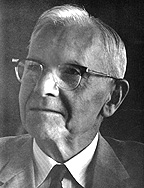Winter Remembered
Two evils, monstrous either one apart,
Possessed me, and were long and loath at going:
A cry of Absence, Absence, in the heart,
And in the wood the furious winter blowing.
Think not, when fire was bright upon my bricks
And past the tight boards hardly a wind could enter,
I glowed like them, the simple burning sticks,
Far from my cause, my proper heat, my center.
Better to walk forth in the murderous air
And wash my wound in the snows; that would be healing,
Because my heart would throb less painful there,
Being caked with cold, and past the smart of feeling.
Which would you choose, and for what boot in gold,
The absence, or the absence and the cold?
This poem is in the public domain. Published in Poem-a-Day on January 8, 2023, by the Academy of American Poets.
“Winter Remembered” was first published in the Sewanee Review vol. 30, no. 1 (January 1922), and again in John Crowe Ransom’s collection Chills and Fever (Alfred A. Knopf, 1924). In “Persona and Perspective in John Crowe Ransom’s Poetry,” published in The Mississippi Quarterly vol. 30, no. 1, Jane Marston, former professor of writing and literature at Vanderbilt University, Mercer University, and the University of Georgia, examines the “matured dualism” of Ransom’s verse which “acknowledges the discrepancy between the ideal and the actual,” as well as between the self and the world. She writes, “‘Winter Remembered’ resembles a conventional monologue or soliloquy because it directs attention to the thoughts of a first-person narrator. Ransom follows the example of the metaphysical poets by using ‘public’ images to suggest the speaker’s attitude: ‘A cry full of Absence, Absence in the heart, / And in the wood the furious winter blowing.” He carefully avoids the suggestion of a causal relationship between Absence and winter when he undercuts the pathetic fallacy and renders emotion through the poignant but unsentimental objectification of grief. By using metaphors drawn from nature, Ransom transforms a private experience, the loss of love, into a universal one but retains sympathy for the speaker by having the reader share the first-person point of view.”

